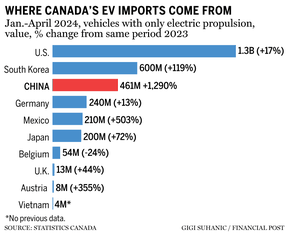Desjardins Financial looks at whether they are fact or fiction in a new report
Article content

Housing affordability in Canada is a problem. That’s a fact.
But there is still plenty of uncertainty when it comes to the underlying causes and the potential policy fixes — besides building a lot more homes — that could make it better.
Desjardins Financial economist Marc Desormeaux looked at four popular solutions — from extending amortizations to reducing immigration — to determine whether they are more fact or fiction.
Advertisement 2
Article content
Extending amortizations
Mortgages with a 25-year amortization — the repayment period for the loan — are the “industry standard,” but longer amortizations have been touted as a potential fix for affordability because they reduce monthly mortgage payments and lower the amount of income homebuyers need to qualify for a mortgage.
Desormeaux ran a scenario assuming a new standard of 35 years, but found that not only would it fail to improve affordability, it also would make it worse in the long run, as increases in disposable income stoked housing demand and prices.
“Affordability would eventually become even worse … as initial gains are overcome by a more dramatic rise in home values,” he said.
Extending amortization periods could also ratchet up financial risks in the lending system, he added.
Less immigration
In March, Ottawa announced it would cut the number of non-permanent (NPR) residents by 25 to 30 per cent by 2026 starting this fall as it looked to answer critics who argue that record immigration has strained Canada’s housing supply.
Slowing population growth would weaken housing demand, Desormeaux said, but could also lead to fewer home listings, which would cause prices to rise.
Article content
Advertisement 3
Article content
He also said less immigration will hurt efforts to build more homes.
“NPRs also tend to rent more than the broader Canadian population, so the policy’s potential impact on home prices may be limited,” Desormeaux said.
A spike in home listings
A flood of listings could help to drive down prices and improve affordability, Desormeaux acknowledged.
He said a sharp rise in the number of homes available for purchase is possible if “financially strapped” homeowners decide to sell as the housing market picks up or if baby boomers opt to sell to downsize or rent.
Still, a “spike” in listings in the months to come “is a highly unlikely trajectory,” the economist said.
Even if listings per capita rise to levels recorded during the 1990s recession and the early 2000s, that won’t be enough to bring affordability back to pre-COVID levels under Desjardins’ modelling.
Recession
Some say a financial downturn could improve housing affordability, but be careful what you wish for, Desormeaux warns.
“While economic downturns do usually result in meaningful home value depreciation, they also tend to bring interest rate cuts, the stimulative effects of which mitigate price declines,” he said.
Advertisement 4
Article content
Economic downturns such as the Great Recession of 2008 also boost unemployment and often result in loss of income.
Under Desjardins’ recession scenario, household disposable income would be $20 billion lower than under its base case by 2025, Desormeaux said.
“With that in mind, those hoping for a recession should not only be weighing their homebuying ambitions against immense longer-term economic and social costs; they should also be thinking about how much more affordable a home would actually be for them if their financial situation changed,” he said.
Sign up here to get Posthaste delivered straight to your inbox.


The rise of electric vehicles helped bring environmentalists and the Canadian auto sector closer together. Now, the threat of Chinese-made electric vehicles is pushing them apart.
A schism between the two sides came into view last week after the federal Liberals announced a 30-day consultation on how to protect Canadian auto workers from what Deputy Prime Minister Chyrstia Freeland characterized as a potential flood of cheap EVs from China. — Gabe Friedman, Financial Post
Advertisement 5
Article content
Read the full story here.

- Vancouver releases home sales figures for June
- Francois-Philippe Champagne, minister of innovation, science and industry, and Iliana Ivanova, European commissioner for innovation, research, culture, education and youth, will sign an agreement on science, research and innovation to enhance Canada’s collaboration with the European Union.
- Today’s data: Canada international merchandise trade, U.S. Challenger job cuts, initial and continuing jobless claims, trade balance
- Earnings: Constellation Brands Inc., TransAlta Renewables Inc.



Recommended from Editorial
-

Three-year mortgages remain biggest crowd-pleaser
-

Rising mortgage debt service ratios are must-watch data

Canadians who are heavily invested in their domestic market can be excused for looking with envy south of the border at the gains of the S&P 500 and the Nasdaq this year as Canada’s S&P/TSX composite index continues to languish. Even beyond the United States, the TSX was one of the worst performers among markets in other developed countries, writes investing columnist Peter Hodson. So, why is it so bad relative to its global peers? Hodson gives five reasons here.
Advertisement 6
Article content
FP Answers
Are you worried about having enough for retirement? Do you need to adjust your portfolio? Are you wondering how to make ends meet? Drop us a line at aholloway@postmedia.com with your contact info and the general gist of your problem and we’ll try to find some experts to help you out while writing a Family Finance story about it (we’ll keep your name out of it, of course). If you have a simpler question, the crack team at FP Answers led by Julie Cazzin or one of our columnists can give it a shot.
McLister on mortgages
Want to learn more about mortgages? Mortgage strategist Robert McLister’s Financial Post column can help navigate the complex sector, from the latest trends to financing opportunities you won’t want to miss. Read them here
Today’s Posthaste was written by Gigi Suhanic, with additional reporting from Financial Post staff, The Canadian Press and Bloomberg.
Have a story idea, pitch, embargoed report, or a suggestion for this newsletter? Email us at posthaste@postmedia.com.
Bookmark our website and support our journalism: Don’t miss the business news you need to know — add financialpost.com to your bookmarks and sign up for our newsletters here.
Article content
Canada’s housing affordability: 4 ways to fix it
2024-07-03 12:00:12







